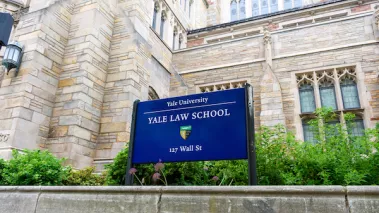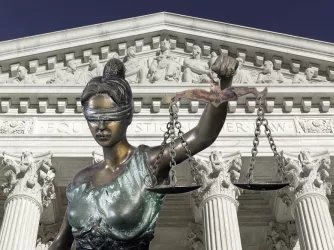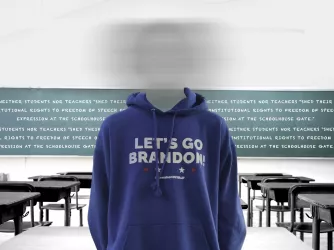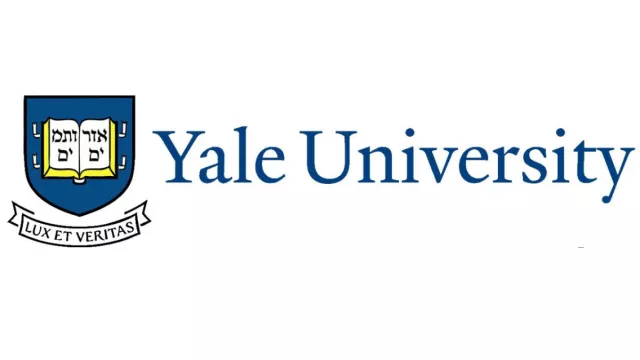Table of Contents
Yale Law dean’s message to alumni promises free speech changes. We’re (very) cautiously optimistic.

Michael Vi / Shutterstock.com
In the message to Yale Law alumni, Dean Heather Gerken outlined the “concrete steps” the law school has taken “to reaffirm our enduring commitment to the free and unfettered exchange of ideas.”
Among the influential Ivies with a terrible free speech track record (Harvard and Columbia spring immediately to mind), Yale might have the edge when it comes to sheer number of campus controversies.
Starting in 2015 with its viral Halloween costume imbroglio, Yale has since weathered poorly-handled speaker shout-downs, created a COVID-19 surveillance state, and was caught on tape trying to force a student to apologize for something he had every right to say. And let’s not forget that, in response to a faculty member’s free speech lawsuit, Yale disavowed its free speech promises, saying commitments like the one contained in its famous 1974 Woodward Report aren’t contractually binding.
These transgressions, and more, earned Yale FIRE’s 2022 Lifetime Censorship Award and surely contributed to its almost-dead-last showing in our College Free Speech Rankings. But FIRE, ever hopeful that change could yet be on the horizon, hopes a strong (albeit imperfect) statement last week from Yale Law School’s dean could usher in that long-awaited era.
In the message to Yale Law alumni, Dean Heather Gerken outlined the “concrete steps” the law school has taken, beyond what the broader Yale administration has done, “to reaffirm our enduring commitment to the free and unfettered exchange of ideas.”
Gerken first cited — after a Yale Federalist Society event faced severe disruption in March — the law school’s subsequent statement making it “unequivocally clear that attempts to disrupt events on campus are unacceptable and violate the norms of the School, the profession, and our community.”
Gerken also noted the creation of “an online resource outlining our free speech policies,” a “redesigned Orientation to center around discussions of free expression and the importance of respectful engagement,” and a recently-hired Dean of Students, Jennifer Cerny, who “is focused on ensuring students learn to resolve disagreements among themselves whenever possible rather than reflexively looking to the institution to serve as a referee.” She also replaced a digital listserv which reportedly became a source of acrimonious student infighting and “pile-ons” with what Gerken said “alumni fondly remember as ‘the Wall’ to encourage students to take time to reflect and resolve their differences face-to-face.”
What remains to be seen is whether Yale alumni will declare Gerken’s promises, on net, a victory for speech.
Gerken also pointed to two revised policies: a faculty-revised disciplinary code, and a policy prohibiting surreptitious recordings, that mirror “policies that the University of Chicago and other peer institutions have put in place to encourage the free expression of ideas.” FIRE has frequently lauded UChicago’s “Chicago Statement” as the gold standard free speech policy statement.
If put into practice, these appear to be uniformly positive changes. But not so fast.
Yale’s new ban on surreptitious recording does not actually appear to track the Chicago Statement, as Gerken suggests. Chicago’s policy prohibits only recording classes, lectures and university events. And that’s a good thing, as secretly recording instructors can be used to censor or intimidate faculty. The Chicago policy does not go so far as Yale now does, in banning all recording on campus. Yale’s more expansive prohibition would reach recordings like the one that catalyzed the Trent Colbert/Yale “Trap House” scandal — which allowed the public to hear Yale administrators pressuring Colbert to apologize. It was a resounding embarrassment for Yale, with the dean heard on tape retiring, and high profile outlets like The Washington Post and The Atlantic covering the fallout.
What remains to be seen is whether Yale alumni will declare Gerken’s promises, on net, a victory for speech. Fight for Yale’s Future, an independent alumni group dedicated to transparency in governance, free inquiry, academic excellence, and curbing administrative bloat, organized a petition to urge the school to reform its restrictive speech codes, adopt a formal free expression statement, and annually survey students to gain an understanding of the climate on campus. Almost 1,500 people have signed it to date. This focus on promoting free speech and academic discourse at Yale has attracted hundreds of alumni to the cause.
Because many of the actions taken on by the law school align with the alumni’s petition demands, it seems Yale Law may be listening.
Yale’s famous Woodward Report (even if Yale’s lawyers won’t acknowledge it) is still in effect — committing the university to the broadest possible conception of free expression, proclaiming: “Above all, every member of the university has an obligation to permit free expression in the university.” But permission, as the report also says, is not enough. “Every official of the university … has a special obligation to foster free expression and to ensure that it is not obstructed.”
Dean Gerken has taken a promising first step for Yale’s law school, at least, toward meeting these critical obligations. FIRE remains hopeful the broader university’s dark, censorious days may soon be history.
Recent Articles
FIRE’s award-winning Newsdesk covers the free speech news you need to stay informed.

Supreme Court must halt unprecedented TikTok ban to allow review, FIRE argues in new brief to high court

Australia blocks social media for teens while UK mulls blasphemy ban

Free speech advocates converge to support FIRE’s ‘Let's Go Brandon’ federal court appeal



